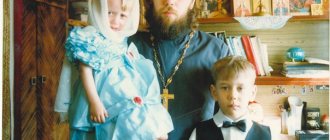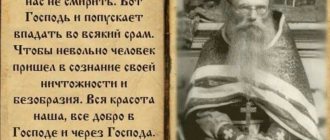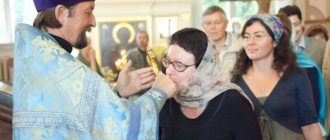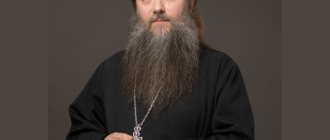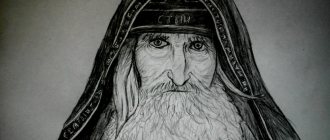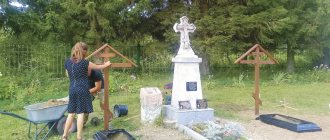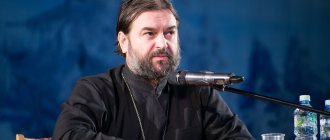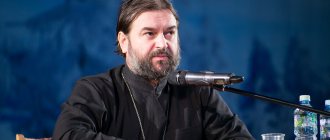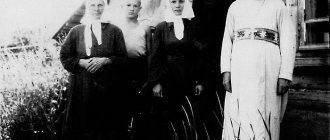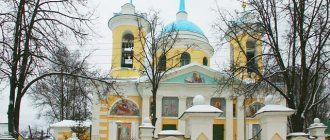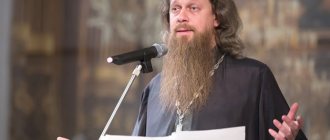| Archpriest Vladimir Vorobyov |
Vorobyov Vladimir Nikolaevich
(born 1941), mitred archpriest, rector of the Moscow Church of St. Nicholas the Wonderworker in Kuznetsy, professor, rector of the Orthodox St. Tikhon Humanitarian University, deputy chairman for licensing, accreditation and standards of the Educational Committee of the Russian Orthodox Church, secretary of the Synodal Commission on Canonization of Saints, member of the Inter-Council Presence of the Russian Orthodox Church Born on March 28, 1941 in Moscow. His father taught at the Faculty of Philosophy of Moscow State University, his grandfather - Archpriest Vladimir Vorobyov - was a dean, rector of the Moscow Church of St. Nicholas in Plotniki on Arbat.
In 1959–1965 he studied at the Faculty of Physics of Moscow State University. In 1973, he received the academic degree of Candidate of Physical and Mathematical Sciences and was hired at the Computing Center of the USSR Academy of Sciences.
In 1978 he entered the Moscow Theological Seminary, which he graduated in absentia in 1980, and in 1982 he graduated from the Moscow Theological Academy.
On March 18, 1979, he was ordained a deacon, and on April 30, a priest.
He served in the Church of the Kazan Icon of the Mother of God in Kolomenskoye, then in the St. Nicholas Church near the Transfiguration Cemetery. In 1984 he was transferred to the Assumption Church in Veshnyaki, in 1990 - to the Church of St. Nicholas the Wonderworker in Kuznetsy, in 1997 he was appointed rector of the Nikolo-Kuznetsky Church and the attached Church of the Life-Giving Trinity in Veshnyaki, which was opened and restored under his leadership.
In October 1990, he participated in the creation of a brotherhood in the name of the All-Merciful Savior, which over time turned into one of the largest brotherhoods in Russia (in 1994 it looked after 14 churches, of which 13 were being restored). Became the brotherhood's confessor. Under his leadership, Orthodox general education and Sunday schools, children's camps, a canteen for the poor, and the Orthodox Word bookstore were created.
In the late 80s, together with other priests, he organized an Orthodox lecture hall. In January 1991, theological and catechetical courses were opened on the basis of the lecture hall, and in May of the same year he was elected rector of the courses. On his initiative and with the blessing of His Holiness Patriarch Alexy II of Moscow and All Rus', the courses in 1992 were transformed into the Orthodox St. Tikhon's Theological Institute (PSTBI), (since 2004, the Orthodox St. Tikhon's Humanitarian University). While remaining rector, in 1997 he was awarded the title of professor. At the university he lectures on the subjects “Introduction to the liturgical tradition of the Orthodox Church” and “Pastoral Theology.” Under his leadership, the PSTBI developed a state educational multi-confessional standard in theology, which became the basis for the opening of the specialty “Theology” in the state classifier and the creation of theological faculties and departments in state universities.
He is one of the organizers of the study of the history of the Russian Church in the century and the glorification of the new Russian martyrs. At PSTGU, he heads the Department of Contemporary History of the Russian Orthodox Church, which does a lot of work on collecting materials about the persecution of the Orthodox Church in Russia in the 20-40s of the century and publishes the scientific series “Materials on the Contemporary History of the Russian Orthodox Church” (since 1994). In 1998, he joined the Synodal Commission for the Canonization of Saints, and actively participated in the preparation of the large-scale canonization of new martyrs and confessors of Russia at the Bishops' Jubilee Council of the Russian Orthodox Church in 2000.
He is deputy chairman for licensing, accreditation and standards of the Educational Committee of the Russian Orthodox Church, a member of the Synodal Theological Commission, the Publishing Council of the Moscow Patriarchate, the scientific and editorial council for the publication of the Orthodox Encyclopedia, and other church and secular scientific and educational associations and organizations.
Since July 27, 2009, member of the Inter-Council Presence of the Russian Orthodox Church.
On October 22, 2015, he was appointed secretary of the Synodal Commission for the Canonization of Saints [1].
Author of many works on the modern history of the Russian Orthodox Church, liturgical tradition of the Church, and pastoral theology.
education
In 1959 he entered the physics department of Moscow State University, from which he graduated in 1965. In 1965-1966 he worked at Moscow State University, then from 1968 he studied in graduate school[1].
Since 1970 he worked at the Computing Center of the USSR Academy of Sciences. In 1973 he graduated from graduate school, and in the same year defended his dissertation for the degree of candidate of physical and mathematical sciences “Analytical and numerical solution of one class of spatial contact problems of the theory of elasticity” [2].
In 1978 he entered the Moscow Theological Seminary[1]. Graduated from the Moscow Theological Seminary (1980) and the Moscow Theological Academy (1982).
He became one of the organizers of theological and catechetical courses[1].
On May 29, 1991, at a meeting of the educational council of the Theological and Catechetical Courses, he was elected the new rector by secret ballot[3]. Retained the position after the courses were converted into the Theological Institute in 1992. Since 1997 - professor.
Chairman of the Federal Educational and Methodological Association for Theology.
The income of our temple literally “collapsed.” Someone said: “Father Vladimir has gone crazy.”
A very short time passed, and the Lord sent us benefactors who still support our university, and now literally everything in our churches has been renovated - the roof, floors, windows, heating system, electrical wiring have been replaced, the iconostases have been re-gilded, the entire territory has been landscaped, houses have been built . We would never have received so much money in the temple if we had charged for services. The Lord rewards a hundredfold those who work selflessly in the Church.
– Father Vladimir, you are a graduate of the physics department of Moscow State University, a candidate of physical and mathematical sciences, an employee of the computer center of the USSR Academy of Sciences, how do you assess the current state of higher education in general in our country?
– I am not sufficiently aware of the numerical estimates of the education reforms carried out in recent decades, but it seems to me that they not only do not achieve the declared goals, but also do not bring significant benefits to our state.
I am afraid that carrying out the reforms themselves costs more than pre-reform education cost. In addition, the quality of education that was in our country before the reforms was quite high, and I am not sure that it has improved as a result of the reforms. Reforms, of course, are needed, because... life does not stand still, but it is not so easy to make truly reasonable improvements in such a huge system as education in our country.
Now we see that a colossal bureaucratic system has been created both in the center and locally, which itself absorbs huge funds and forces educational institutions to work for themselves to a much greater extent than before. We are all literally drowning in a sea of papers - reports, instructions, regulations, constantly changing requirements. There is simply no time to do real work - education, science. And the result is obvious - the quality of our education is declining everywhere. I think this is especially noticeable and especially tragic in the field of natural sciences and high technology.
– What do you see as the fundamental problems of modern society and the education of the new generation?
– Society has become different. Modern children, already at school, think and talk more and more about money. Students think about money. Everyone is focused on future high earnings. Most of all, modern youth are interested in material life. When we were studying, we were interested in science. I never thought about money at all. When I was not yet a priest, I also never looked for a high salary. I chose a place that would pay less, but it would be more interesting to work.
Many lived like this; no one thought about money as they do now, although our standard of living was much lower than it is now.
Apparently, there is such a pattern: having lost the spiritual height of life in the Orthodox faith, our people found themselves at a lower level, being in a sense carried away by the ideology implanted by the communists. And, having become disillusioned with ideology, he sank even lower to the level of material interests alone.
– What worries you most today when it comes to problems with education? It seems that the textbooks have not changed much; it seems that many teachers have remained from Soviet times...
– The level has dropped greatly simply because many talented teachers and talented scientists have left. We are experiencing a kind of exodus from Russia. Our science, our education, to a large extent, went to America and Europe and found themselves in great demand there. And in our homeland, our scientists and engineers cannot find a place where their talents will be realized.
Well, a paradigm shift, as they say. Our society now has different values. Scholarship and education are no longer in honor. The main question is neither “what do you believe in?”, nor “what do you do?”, but “how much do you earn? what is your income?
– This question is not so much about wealth, but about how to live and work with the money that is paid...
– The question, of course, is important: how to live, how to support your family, where to live and how to get an apartment, but there is something else. Even if a person does not think about living conditions. There are no working conditions! The level of science is not what it was before. Previously, our science was in first place in the world, but now it is not.
– What do you think about the reform of the Academy of Sciences, which has been carried out for the last three years?
– It is clear that there is stagnation. It began under Soviet rule. Some marginal trends emerged in the life of the Academy of Sciences. It cannot be said that there were no reasons to raise the question of reforms. The question is: what reforms? It is necessary to transform it in such a way that the main thing is not lost, so that it becomes better, not worse. I'm not sure it works.
The Academy of Sciences is a huge structure that has accumulated enormous scientific potential and created a powerful scientific school. She cannot be treated lightly. The school always relies on the older generation, who, perhaps, are no longer so active creatively, but are bearers of invaluable experience. And just as in a family they respect grandfather, grandmother, father and mother, so in any institution, in any society it is necessary to value the older generation. In addition, the older generation has an image, which is also very important.
– Is there any interaction today between church science and secular science? Can you share any interesting examples?
- Of course I have. This is most noticeable in Russian history, because the history of Russia is inextricably linked with the history of the Russian Church. This connection was completely forgotten during Soviet times, and the entire history of Russia turned out to be largely falsified. Now this gap can be filled, historians understand this, they are very interested in the history of the Church. Even at the Faculty of History of Moscow State University, a Department of Church History was opened.
The situation is similar in the philosophical direction. Philosophy under Soviet rule was such a party discipline that now it is not easy to return to Russian religious philosophy, but there is a certain groundwork. Russian religious philosophy is now taught in secular universities. Many people nowadays are interested in church science, because it is also moving forward.
– With your very active participation, it was possible to introduce theology into the list of scientific disciplines of the Higher Attestation Commission, what does this mean? Can you tell us about the path you had to go through?
– Without false modesty, I will say that this is indeed mainly the result of the work of our university. We have fought from the very beginning to ensure that the opposition between secular education and religious education disappears.
The previous law “On Freedom of Conscience” clearly stated that religious education is the training of clergy, which, of course, cannot correspond to reality. Religious education is any education that is based on a religious worldview. Such education under Soviet rule was semi-legal - only three theological schools remained, and their diplomas were not recognized by the state.
– That is, it was only within the framework of a few educational institutions?
– Only in seminaries and theological academies. With great effort, we managed to make religious education completely legitimate and accessible. Today, the program of a secular school includes “Fundamentals of Orthodox Culture”; there are Orthodox schools, Orthodox universities, departments of theology in secular universities, and a professional state standard in theology has been developed. Now theology is also included in the Higher Attestation Commission system.
A decision was made to establish academic degrees - candidate and doctor of theology. Now we are at the stage of creating an Orthodox dissertation council on theology and an expert council on theology at the Higher Attestation Commission. This means that the wall erected by Lenin and the Bolsheviks - the decree on the separation of the school from the Church - has been destroyed.
– St. Tikhon’s University has done a lot in the field of studying the lives of the new martyrs and confessors of Russia. Do you think that today the veneration of new martyrs and confessors has become a significant component of our church life?
– It has, but it’s far from enough! Previously, I had only a rough idea of the extent to which the veneration of the new martyrs was widespread. In the fall, I was unexpectedly appointed secretary of the Synodal Commission for the Canonization of Saints, and although I have been a member of it for 18 years, a new horizon opened up for me in my new position.
Every week we receive a batch of new cases for consideration by the commission on the canonization of previously uncanonized ascetics. These cases are sent from various regions by diocesan commissions. This means that this work is underway in many dioceses, but I think this is only the initial stage.
– What about in everyday life? So I read that few children are named after the new martyrs, people still know little, they are little interested. Do you see any way out?
– In our church there are many people with the names of new martyrs. Little by little, of course, veneration is expanding. On the other hand, it's not so easy. This is something that enters consciousness not over weeks or months, but over years or decades.
- Why?
– The Church, first of all, thank God, is conservative. Tradition and habit play a very important role in the Church. People are accustomed to the veneration of St. Nicholas, St. Sergius, and St. Seraphim, but how did this happen? This has been going on for decades, even centuries! For example, St. Seraphim was canonized 70 years later, but the Hieromartyr Hermogenes was glorified only 300 years after his death. The veneration of the baptizer of Rus', Prince Vladimir, as a saint was established only under Alexander Nevsky. Although in many principalities he was revered as a saint already in the 11th century.
In the minds of new generations, the veneration of holiness is not established quickly. A lot depends on the older generation, and this modern older generation was raised outside the Church. They cannot, do not know how to convey the veneration of the new martyrs, because... They themselves have not revered them since childhood.
Archpriest Vladimir Vorobyov
I remember that as a child I once found a photograph at home from the 20s of the last century: in the middle was Patriarch Tikhon, and next to metropolitans Kirill, Agafangel, Peter, Archbishops Fedor (Pozdeevsky), Hilarion (Troitsky) - the closest associates of Patriarch Tikhon. I asked my father and he told me about each of them, and I have loved them since childhood.
hierarchy
On March 18, 1979, he was ordained a deacon, and on April 30, a priest[4], after which he served as a cleric in the Church of St. Nicholas at the Transfiguration Cemetery[1].
In 1984 he was transferred to the clergy of the Church of the Assumption in Veshnyaki[1]. In 1990 he was appointed cleric of the Nikolo-Kuznetsk Church.
On September 12, 1997, he was appointed rector of the St. Nicholas Church[4] and the associated Church of the Life-Giving Trinity in Vishnyaki, the home gymnasium church of the Hieromartyr Peter (Polyansky), and the home church in the Diocesan House in Likhov Lane[1].
The loss of Eucharistic life is one of the reasons for the revolution and persecution of the Church
The celebration of the Eucharist constantly, even daily, has long become the norm for Christian peoples. And, of course, it is all the more strange to see that the Eucharist is celebrated, but there are no communicants! This is complete nonsense. It is proclaimed: “Take, eat, this is My Body,” but no one wants to accept the Body of Christ and no one wants to partake of the Blood of Christ. The rules of the Holy Apostles qualify this as an insult to God.
If it is not possible to celebrate the liturgy, this is a different matter, but if the liturgy is celebrated, then not receiving communion is more than strange.
Nevertheless, in pre-revolutionary Russia the tradition of taking communion once a year was established. Unfortunately, most of the Russian people accepted this abnormal situation as the norm. And there is an opinion (with which it is difficult to disagree) that precisely this loss of Eucharistic life is one of the reasons for the revolution and persecution that came to the Church.
When the people retreated from the Church, cooled in faith, retreated from love for Christ, were able to live without the sacrament that unites them with Christ, they suffered troubles, misfortunes, sorrows, mortal suffering inherent in life without God in a world that “lies in evil” , whose prince is the devil. Only then did people again begin to pray with all their hearts, began to repent and receive communion. During the period of persecution, there was no longer a question of how often one should receive communion - everyone tried to receive communion as often as possible. Because it was scary! When they stopped allowing people into churches, when churches were taken away, blown up, closed, Christians began to celebrate the Liturgy in their homes secretly, like the first Christians, and tried to be sure to receive communion.
church positions
Member of the Synodal Commission for the Canonization of Saints.
Since 2002, simultaneously deputy chairman of the educational committee at the Holy Synod of the Russian Orthodox Church.
Since 2004 - member of the Synodal Theological Commission. Since 2015 - Chairman of the Federal Educational and Methodological Association in the higher education system for an enlarged group of specialties and areas of training “48.00.00 Theology”[5].
On February 1, 2022, by decision of the Holy Synod, he was included in the organizing committee created at the same time to implement the program of church-wide events for the 100th anniversary of the beginning of the era of persecution of the Russian Orthodox Church[6].
Adult years
Later, Vladimir found his spiritual fathers. He met with historical figures who personally knew Patriarch Tikhon, Metropolitan Peter and many holy people. At one time his spiritual father was John. When Khrushchev's power ended, some changes began in church life.
One day Father John fell ill and was taken to the capital. It was necessary to attend to his confession and communion. At that time it was difficult to do this, and at that moment Father Vsevolod was suggested to those around John. He agreed to perform these sacraments.
And then Vsevolod became the spiritual father of Vladimir. One day he died, and then Paul became the spiritual father. He was a perspicacious old man who knew how to answer unasked questions. He was a strict and demanding person. At the same time, he lived in love.
awards
state
- Medal of the Order of Merit for the Fatherland, II degree (August 11, 2000) - for great contribution to strengthening civil peace and reviving spiritual and moral traditions[9]
- Medal “In Memory of the 850th Anniversary of Moscow” (1997)
departmental
- Badge “Honored Worker of Higher Professional Education of the Russian Federation” (2001)
- Certificate of Honor from the Ministry of Education of the Russian Federation (2007)
church
- The right to wear the Patriarchal Cross (05/02/2016)[10]
- Order of the Holy Equal-to-the-Apostles Grand Duke Vladimir, III degree (July 26, 2015; “in consideration of the work on the restoration of the house church of the Holy Equal-to-the-Apostles Prince Vladimir Orthodox St. Tikhon’s Humanitarian University and the Moscow Diocesan House” [11])
- A pectoral cross made on the occasion of the celebration of the 1000th anniversary of the repose of Equal-to-the-Apostles Prince Vladimir (July 26, 2015; “in consideration of the work on the restoration of the home church of St. Equal-to-the-Apostles Prince Vladimir Orthodox St. Tikhon’s Humanitarian University and the Moscow Diocesan House”)[11].
- Order of St. Innocent, Metropolitan of Moscow and Kolomna II degree (April 30, 2011)[12]
- Order of St. Innocent, Metropolitan of Moscow and Kolomna III degree (ROC, 2001)
- Medal of St. Seraphim of Sarov, II degree (October 3, 2007)[13].
- Order of St. Macarius, Metropolitan of Moscow, II degree (December 5, 2007; “for hard work and in connection with the 15th anniversary of PSTGU” [14])
- Medal of St. Sergius of Radonezh
- Medal of St. Seraphim of Sarov, II degree (ROC, 2007)
- Medal of St. Innocent, Metropolitan of Moscow and Kolomna (ROC, 2000)
Childhood
The archpriest's most vivid memories of his childhood are associated with the people around him. There were always a lot of different people around his family. The family lived in a communal apartment, and in these conditions the family tried to maintain contact with believers.
In the 40s and 50s you couldn't go to church on a regular basis. This threatened with expulsion from school and dismissal from work. However, Vladimir Vorobyov’s mother took the child to confession. At that time, the rector of the nearest church said that Vladimir would become a priest.
From an early age, Vladimir was drawn to serve. This desire was probably provoked by stories about his grandfather, whom the family loved very much. Representatives of the church intelligentsia gathered in churches in those years. They sought to be friends with families.
pathological speech
Knows the language of secularism:
- Theological, or theological, faculties and departments at universities... successfully prepare personnel capable of conducting the urgently needed dialogue between the Church and society[7].
Image stamps
: “It is important to improve
the image of a large family
” [8].
Peace and harmony
: “Here (at a meeting of the Council on Theology of the Educational and Methodological Association for Classical University Education. - Ed.) we act very amicably, showing interreligious peace and harmony”[9].
Perspective, vision, measurement
: The services of Holy Week “lead us to a spiritual perspective, to a comprehensive vision of life - not only in its earthly dimension, but what is much more important - in the spiritual dimension”[10].
Openness to the world
: “The usual problems for a denominational educational institution: the need to constantly increase the level of attractiveness of the educational institution, while improving professional training, not to lose the “spiritual component”, while maintaining
the openness of the educational institution to the world
, not to lose the main thing - the “otherworldliness” of the Christian dispensation, the readiness to selflessly serve God, and not just their own interests”[11].
Positioning
: The positioning of theology in the educational space, found as a result of the joint efforts of the authorities, confessions and the whole society, allows us to saturate the confessional sphere, the area of state-confessional and interreligious dialogue with domestic, rather than imported, specialists, without which achieving civil harmony in a multi-confessional and multi-ethnic country is problematic [12].
Archetype
: Religious studies uses archetypes, conceptual apparatus, terminology, etc. developed by theology[13]
Ghetto curse words
: “The Orthodox St. Tikhon’s Theological Institute was created 15 years ago from catechetical courses. Our goal was to take advantage of the new freedom to get out of the ghetto into which the Church was driven by Soviet power.”[14]
Legalism
: “From the point of view of Catholics, marriage is an agreement between two parties about an alliance... and here there is a jurisprudence alien to Orthodoxy”[15].
techniques
oxymoron
- We have proven that religious secular education
can exist[16]. - Our job is to show that religious secular education
[17].
pathological vocabulary
Archetype, Vision, Ghetto, Affordable, Dimension, Image, Roots, Lesser evil, Peace and harmony, Monastic ideal, Volumetric, Openness to the world, Perspective, Secular, Modern format, Component, Legalism, Legal
essays
- Repentance, confession, spiritual guidance. - With. Remsha (Ivan region): Rodnik, 2000. - 94 p. - (Christian interlocutor / Published by Makariev-Reshem. monastery “Light of Orthodoxy”). — ISBN 5-89466-007-6.
in collections
- Help my unbelief. Selected publications of the magazine “Foma” 1997-2000. / Comp. Svetlana Gorokhova. - M.: PSTGU; Foma Center, 2005. - 352 p. — ISBN 5-7429-0059-7.
editor, author of the foreword
- Fudel, Sergei Iosifovich
Notes on Liturgy and the Church / Preface. V. Vorobyova; Note Yu. S. Terentyeva. - M.: PSTGU, 1996. - Fudel, Sergei Iosifovich
Collected works in 3 volumes. - M.: Russian way, 2001. - Orekhanov, Georgy O.
On the way to the Cathedral. Church reforms and the first Russian revolution. - M.: PSTGU, 2002. - Cephas. Patriarchal Locum Tenens Hieromartyr Peter, Metropolitan of Krutitsky (1862 - 1937). - M.: PSTGU, 2012.
- Those who suffered for Christ: Persecution of the Russian Orthodox Church, 1917-1956: Biogr. reference / Comp. V. Vorobiev (director), etc.]; Under hand and general ed. V. Vorobyova. - M., 1997.
- Those who suffered for Christ. Persecution of the Russian Orthodox Church, 1917-1956. biographical reference book. - M.: PSTGU, 2015.
- Father Arseny. Memoirs of students and followers. Part IV of the book is published for the first time / Ed. Archpriest V. Vorobyova. - M.: PSTBI, 1998. Father Arseny. Collection / Ed. Archpriest V. Vorobyova. - M.: PSTBI, 1998.
- Father Arseny. Memoirs of students and followers. Part V of the book is published for the first time / Ed. Archpriest V. Vorobyova. - M.: PSTBI, 2000.
- Father Arseny / Ed. Archpriest V. Vorobyova. - M.: PSTBI, 2001.
- Father Arseny / Ed. Archpriest V. Vorobyova. - M.: PSTBI, 2002.
- Father Arseny / Ed. Archpriest V. Vorobyova. - M.: PSTGU, 2008.
- Father Arseny / Ed. Archpriest V. Vorobyova. - M.: PSTGU, 2009.
- Father Arseny / Ed. Archpriest V. Vorobyova. - M.: PSTGU, 2012.
- Father Arseny / Ed. Archpriest V. Vorobyova. - M.: Eksmo; PSTGU.
- Father Arseny / Ed. Archpriest V. Vorobyova. - M.: PSTGU, 2013.
articles
- On the 4th Sunday after Pentecost // Journal of the Moscow Patriarchate. - 1985. - No. 7. - P. 37-38.
- On the 12th Sunday after Pentecost // Journal of the Moscow Patriarchate. - 1985. - No. 8. - P. 43.
- Word // Bulletin of the Orthodox St. Tikhon’s Theological Institute. 1992. - No. 1. - P. 37-40
- Live life... // Journal of the Moscow Patriarchate. - 1993. - No. 11. - P. 51-54. (co-author)
- The unity of the Orthodox Church and the temptation of schism today // Journal of the Moscow Patriarchate. - 1995. - No. 9-10. — P. 68-73.
- Modern problems of pastoral ministry // Bulletin of the Pastoral Seminar. - 1996. - No. 1. - P. 10-15.
- Modern traditions of celebrating Easter in Moscow parishes // Bulletin of the Pastoral Seminar. - 1996. - No. 1. - P. 35-41. (co-author)
- Orthodox teaching on marriage // Bulletin of the Pastoral Seminar. - 1996. - No. 2. - P. 2-14.
- On licensing and accreditation of higher educational institutions and state standards in the areas of “Theology” and “Religious Studies” // Christmas Readings, 4th. - 1996. - P. 110-118.
- Prospects for higher Orthodox school // Christmas readings, 5th. - 1997. - pp. 57-67.
- Orthodox St. Tikhon's Theological Institute // Theological collection. - 1997. - No. 1. - P. 168-178. (co-authored with A. V. Posternak and O. I. Khailova)
- Archpriest Gleb Kaleda is the first rector of the Catechetical Courses: In Memory of Archpriest. Gleb Kaleda // Theological collection. - 1997. - No. 1. - P. 301-306.
- Archpriest Vladimir Rozhkov // Journal of the Moscow Patriarchate. - 1997. - No. 11. - P. 71-72.
- Features of documents of investigative cases of the 20-40s // Annual Theological Conference of the Orthodox St. Tikhon's Theological Institute: Materials 1997 / ch. ed. V. N. Vorobyov, prot. - M.: PSTBI Publishing House, 1997. - 242 p. — P. 163—166
- Memory of the New Martyrs and the Contemporary History of the Russian Orthodox Church // Annual Theological Conference of the Orthodox St. Tikhon’s Theological Institute. - 1998. - P. 182-186.
- Pastoral ministry in the Russian Orthodox Church in the 20th century. // Annual theological conference of the Orthodox St. Tikhon's Theological Institute: Materials 1999 / ch. ed. V. N. Vorobyov, prot. - M.: PSTBI Publishing House, 1999. - 380 p. — P. 248—264
- Materials for the biography of Hieromonk Paul (Trinity) // Annual Theological Conference of the Orthodox St. Tikhon's Theological Institute: Materials 1999 / ch. ed. V. N. Vorobyov, prot. - M.: PSTBI Publishing House, 1999. - 380 p. — P. 264—271
- A. B. Saltykov: To the 40th anniversary of his death // Theological collection. - 1999. - No. 3. - P. 275-277.
- Will our children leave us? // Not like everyone else: How to teach a teenager to live among his peers. - M.: Danilovsky blagovestnik, 2000. - 152 p.
- The place of religious education in higher education and educational standards in theology // Christmas readings, 8th. - 2000. - P. 177-179.
- Letters of the Hieromartyrs - Bishops of the Russian Orthodox Church to St. Tikhon, Patriarch of Moscow and All Russia // Orthodox St. Tikhon's Theological Institute. Theological collection. - 2000. - Issue. 6. - pp. 5-17
- Some problems of theological-historical science and church life in Russia on the eve of the 2000th anniversary of the Nativity of Christ. On the need to intensify the research and missionary activities of the Russian Orthodox Church in the face of heterodox and ecumenical expansion in Russia // Annual Theological Conference of the Orthodox St. Tikhon’s Theological Institute. - 2000. - P. 257-267.
- Problems of Orthodox education today (actual speech at the Institute holiday on November 18, 2001) // Orthodox St. Tikhon’s Theological Institute. Theological collection. - 2002. - Issue. 9. - pp. 5-14
- Orthodox education - problems and prospects // Collection of plenary reports of the X International Christmas educational readings. - M.: Department of Religious Education and Catechesis of the Russian Orthodox Church, 2002. - 352 p. — P. 129—135
- On the centenary of the birth of Archpriest Vsevolod Shpiller // Journal of the Moscow Patriarchate. - 2002. - No. 7. - P. 64-72.
- Some problems of the canonization of saints today // Annual Theological Conference of the Orthodox St. Tikhon's Theological Institute: Materials 2002 / ch. ed. V. N. Vorobyov, prot. - M.: PSTBI Publishing House, 2002. - 439 p. — P. 156—162
- Opening remarks // PSTGU Bulletin: Pedagogy. Psychology. Series IV. — 2006. — No. 3 — P. 7-19
- The role of education in the development of Christian mission // Christianity in the Far East / International scientific and practical conference (September 19-21, 2006; Khabarovsk); * International scientific and practical conference (September 19-21, 2006; Khabarovsk). - Khabarovsk: Khabarovsk Theological Seminary, 2006. - 220 p. - pp. 213-217.
- University without walls // Higher education today. 2006. - No. 8
- Irina Vasilievna Vatagina // Art of the Christian world: Collection of articles. Vol. 10 / ch. ed. A. A. Saltykov, prot., resp. ed. A. A. Voronova. - M.: PSTGU, 2007. - 627 p. — P. 603—604 (co-authored with Archpriest A. A. Saltykov)
- On the importance of theological education in the Russian Federation // Bulletin of PSTGU: Pedagogy. Psychology. Series IV. - 2007. - No. 4 (7) - P. 7-20
- Temporary Life and Eternal Life // Journal of the Moscow Patriarchate. - 2008. - No. 6. - P. 91-93.
- About the rich man and Lazar // Journal of the Moscow Patriarchate. - 2008. - No. 6. - P. 93-95.
- The Word of the Locum Tenens: Letters from the Locum Tenens Hieromartyr Metropolitan Peter (Polyansky) to Metropolitan Sergius (Stragorodsky) from Tobolsk exile and the people who contributed to the appearance of these documents // PSTGU Bulletin: History. History of the Russian Orthodox Church. Series II. 2009. - No. 3 (32). — P. 37-69 (co-authored with O. V. Kosik)
- Metropolitan Arseny (Stadnitsky) about the Council of 1917-1918. and restoration of the patriarchate // Annual Theological Conference of the Orthodox St. Tikhon Humanitarian University: Materials. - T. 1: XIX / ch. ed. V. N. Vorobyov, prot. - M.: PSTGU, 2009. - 404 p.
- St. Tikhon, Patriarch of Moscow and All Russia // Annual Theological Conference of the Orthodox St. Tikhon Humanitarian University: Materials. - T. 1: XX / ch. ed. V. N. Vorobyov, prot. - M.: PSTGU, 2010. - 417 p.
- Teaching theology at the university is a necessary alternative to the atheistic paradigm in the humanities and education // Bulletin of PSTGU: Theology. Philosophy. Series I. - 2010. - No. 1 (29). - M. : PSTGU - pp. 165-170
- In memory of a friend - Nikolai Evgenievich Emelyanov // PSTGU Bulletin: History. History of the Russian Orthodox Church. Series II. — 2010. — No. 1 (34) — P. 149—156
- Faith and natural science knowledge // PSTGU Bulletin: Theology. Philosophy. - 2012. - No. 2 (40) (co-authored with A. V. Shchelkachev)
- Some problems of glorifying saints for local and church-wide veneration at the end of the 20th - beginning of the 21st centuries. // Bulletin of the Orthodox St. Tikhon Humanitarian University: History. History of the Russian Orthodox Church. Series II. — 2010. — No. 2 (35)
- Studying the modern history of the Russian Orthodox Church at PSTGU: results of twenty years // Annual theological conference of the Orthodox St. Tikhon's Humanitarian University: Materials. XXIII / ch. ed. V. N. Vorobyov, prot. - M.: PSTGU, 2013. - 417 p.
- Orthodox St. Tikhon's Humanitarian University // Great Russian Encyclopedia: [in 35 volumes] / ch. ed. Yu. S. Osipov. — M.: Great Russian Encyclopedia, 2004—2017.
interview
- Faith gives meaning // Sunday school. - 1997. - No. 2. - P. 1
- Questions for the priest // World of God. - 1997. - No. 1 (2). — P. 30-33
- If there is faith, then it is impossible to break such a people // Radonezh. - 1998. - No. 7 (72). — P. 10-11
- To be or not to be... godfather? // Foma. - 1998. - No. 2 (6). — pp. 12-14
- Why do we come to church? // Foma. - 1999. - No. 2 (8). — P. 6-9
- Testifying to the truth // Orthodox conversation. - 2001. - No. 2. - P. 6-9; No. 3. - pp. 6-10
- All life is obedience // Neskuchny Sad. — 2002. — No. 3. — P. 34-37
- Russia has never existed without Orthodoxy // Orthodox Moscow. - 2002. - No. 24 (282). — P. 4
- What is religious education // Neskuchny Sad. - 2003. - No. 6. - P. 50
- Repaying the debt of gratitude // Orthodox conversation. 2003. - No. 3. - P. 12-13
- Is money evil? // Boring Garden. - 2003. - No. 6. - P. 35-42
- Rector of St. Tikhon's Orthodox Theological University, Archpriest Vladimir Vorobyov: “Now our life has become much better than it was. A professor earns about 5-6 thousand” // portal-credo.ru. - 2004. - November 5
- To educate by living example // Foma. - 2004. - No. 3 (20). — P. 58-61.
- Commentary on the article by E. Delaunay “Warm Heart” // Neskuchny Sad. - 2004. - No. 4. - P. 77
- Hate your father and mother? // Foma. - 2004. - No. 5 (22). — P. 44-47
- The priest always sacrifices himself. Interviewed by Vladimir Legoyda // Foma. - 2005. - No. 3 (26). — pp. 16-19, 22-23, 28-31
- There is no life without faith // Orthodox conversation. — 2005. — No. 3. — P. 10-13
- A university without walls. // Higher education today. — 2006. — No. 8. — P. 16-19
- The Church will have its own sociologists / insert into the article “The Face of the Crowd” // Neskuchny Sad. — 2007. — No. 8(28)
- “Orthodox forge of personnel”, interview with Archpriest. V. Vorobyov, author Pavel Krug // “Nezavisimaya Gazeta” - 2007. - June 20
- Preparing for communion: each confessor needs to look for his own answer // Alpha and Omega. - 2007. - No. 49
- “SADNESS BIRTS JOY” // Solovetsky Sea. — 2008. — December
- Life is temporary and life is eternal. About the rich man and Lazar // Journal of the Moscow Patriarchate. - 2008. - No. 6. - P. 91-95.
- On the difference between happiness and pleasure // Foma. - 2008. - No. 11 (67).
- "Who has the future?" // Orthodoxy.Ru. — 2008. — December 30
- Personnel for teaching the fundamentals of Orthodox culture should be prepared first of all by the Church // Patriarchia.ru. — 2009. — August 1
- Rector of PSTGU calls on the state to give theologians the right to an academic degree // RIA Novosti. — 2009. —April 24
- I All-Russian Olympiad for schoolchildren on the fundamentals of Orthodox culture // Journal of the Moscow Patriarchate. — 2009
- Why is reprimanding so popular now? // Boring Garden. — 2009.
- There is no such thing as a convenient Christianity // Orthodoxy and modernity. - 2009. - No. 11 (27). — P. 93-96
- On the threshold of an alarming century // Foma. — 2009
- Now Christianity is greatly compromised // Bogoslov.ru. — 2009. — October 1
- The structure of the soul // Russian birch. — 2010. — April-May
- Lessons of love // Pokrov. — 2010. — No. 1 (469)
- To be talented, smart, independent and work for the Church // Journal of the Moscow Patriarchate. — 2011. — No. 4. — P. 64-71
- Rus' has always been sanctified by the feat of sacrificial love // Pokrov. — 2011. — No. 1
- Only a combination of pastoral love with rigor can produce good results in the education and upbringing of students // Patriarchia.ru. — 2011. — November 29
- Missionary trips are one of the best means of educating future shepherds // Patriarchia.ru. — 2011. — December 13
- Unconscious remnants of the Soviet past and consumer psychology of new parishioners // Patriarchia.ru. — 2012. — January 11
- There is no need to be afraid of having many children // Patriarchia.ru. — 2012. — February 1
- It was the feat of the new martyrs that overcame the division of the two parts of the Russian Church // Patriarchia.ru. — 2012. — May 19
- The main result of PSTGU is our graduates // Patriarchia.ru. — 2012. — November 16
- People thirsted for a word about faith: at the origins of St. Tikhon // Pravmir. — 2012. — November 17
- PSTGU turned out to be too non-commercial from the point of view of the state // Patriarchia.ru. — 2012. — December 17
- Archpriest Vladimir Vorobyov: Orthodox theology is a great treasure that must be preserved and increased // Patriarchia.ru. — 2013. — January 9
- Does the Church need a “secular” theology? // Journal of the Moscow Patriarchate. — 2013. — No. 1. — P. 44-45
- Children from believing families are the most difficult problem for a priest // Pravmir. — 2013. — February 26
- It is naive to expect holiness from all those who call themselves Christians today // Patriarchia.ru. — 2013. — April 22
- “To slander a person is a terrible sin” // Pravoslavie.Ru. — 2014. — January 28
- The diocesan house rose from the dead - and this is a miracle // Pravmir. — 2015. — July 24
Archpriest Vladimir Vorobyov: “We just need to not offend our people”
– Father Vladimir, I would like to start by talking about the main thing in your life – the university. Why did you put all your efforts into creating an institute, then a university, and not into teaching at an already existing educational institution, for example at the Moscow Theological Academy?
– Imagine the situation in our country and in the Church when Perestroika began. Suddenly, the almost century-old Soviet system collapsed, freedom appeared, but it was completely unclear what would happen next.
Events developed spontaneously. The people, tired of Soviet ideological chewing gum, longed to hear the free word of the Church. After all, under Soviet rule, even “getting” the gospel was very difficult.
Responding to this “thirst for hearing the Word of God,” as St. Ignatius Brianchaninov said, we, then young priests, opened a lectorium. There they read a variety of lectures about Orthodoxy, and then answered countless questions.
At first we didn’t plan anything, but did what seemed necessary at that moment. Our listeners began to ask us to organize systematic education: first we opened catechist courses, then - again at the request of students - we turned them into a Theological Institute. Later, our institute received university accreditation status.
Everything happened so naturally that it was clear: this had to be done.
During the course of this educational activity, it became clear that our theological schools, engaged almost exclusively in training only future clergy, icon painters and singers in a boarding school, accepting only men who do not have canonical obstacles to ordination, cannot satisfy the request of the entire church society. Most people who want to receive an Orthodox theological education cannot study there.
It was for such people who remained “outside the theological schools” that we did everything.
At first, the theological schools thought that we would take away their applicants, but it soon became clear that this was not at all the case, because the evening students, who made up our main contingent, did not have the opportunity to enroll. But it turned out that these vecherniks, for the most part, are mature, mature people with life experience who have decided to leave all their affairs and devote themselves to serving God. Many good priests came out of them.
Women and girls began to come to us, and it became clear that we needed not only theological, singing and icon painting faculties, but also missionary, pedagogical, then also historical, philological - this is how the university gradually grew.
– What is the main difference between the educational model of the university today and the educational model of our seminaries and theological academies?
– From the very beginning, we focused specifically on university education, because our first teachers were graduates of Moscow University. From our own experience we knew the model of university education. This is what we wanted to implement for theological education.
– How is it different from the seminary model of education?
– Pace, rhythm, lecture system, then still new for the seminary. Sessions, tests, seminars, student and scientific conferences. We structured education in this traditional way for a university.
The seminary used to be only an intermediate educational institution between the academy and the college; it provided secondary education. We began to build higher university education. In addition, at the beginning we did not have a dormitory; students, as usual, lived outside the university.
– Does the university also carry out intensive research work?
- Yes, sure. And scientific work, which was sorely lacking in theological schools, and practice. Theses are required to be written - at first they were not required of seminarians either. Now many seminaries have become institutions of higher education, and perhaps our example has inspired them to such development.
– Is there a large percentage of graduates who take holy orders and become priests?
– It’s difficult to give an exact figure, because ordination takes place not immediately after graduation, but over time. Graduates usually leave us as laity, and after some time they are ordained.
I think that today about 600 of our graduates have become priests.
This is probably a significant majority among those graduates who entered the university wanting to become clergy and having no canonical obstacles to this. Moreover, they all have state-issued diplomas of higher theological education. This means that the state has recognized Orthodox theological education at a legitimate level.
– Orthodox education – is it fashionable in our society?
– It cannot be said that our education is fashionable. There is no column “theologian” in the list of occupational specialties. It turns out that theologians who do not become clergy, as if “by definition,” must work outside their specialty.
Those who do not become priests work in a variety of fields. Some teach, some do science. Someone goes to the media or administrative service. Some find work that has nothing to do with theological education. One of our graduates, a good one at that, works in a bank, others got jobs in offices. Our specialists are in demand in universities because they have an outlook that is lacking in secular humanitarian universities. For example, our graduates often successfully enter graduate school at Moscow State University.
We do not regret that our graduates work in secular institutions, because we are sure: Orthodox people, literate, intelligent, thinking people are needed everywhere. Our country and our people need them. Such people lead others to faith, this is a fact.
– What, in your opinion, is absolutely necessary to teach young priests?
“Of course, we want them to have a deep, thoughtful faith. So that they are truly educated people who have theological knowledge and know the history of the Church. But the most important thing for a priest is his spiritual life. If a person does not strive to serve God with all his heart and live purely, he cannot be recommended as a priest.
– What is the particular difficulty of pastoral ministry today? Now there is no need for a confessional feat, as it was in Soviet times. What is the main difficulty?
– Confession can be understood in different ways. Now in our country there is no persecution for faith, but still the priest has to “swim against the tide,” because the whole world today is moving not towards Christ, but from Christ.
Even without formulating any obvious anti-Church goals, modern society for the most part is directed away from the Church. The priest lives in society, among people, he constantly needs to withstand the pressure of this “current”, which all the time strives to “carry” him somewhere.
sources
- The first international symposium dedicated to the ethical aspects of banking will take place in Moscow // Patriarchia.ru. — 2010.
Footnotes
- ↑ 1,01,11,21,31,41,5 Department of Contemporary History of the Russian Orthodox Church.
- Abstract in the RSL catalogue.
- "Small leaven."
- ↑ 4.04.1 Clerics.
- Order of the Ministry of Education and Science of the Russian Federation No. 1220 dated October 27, 2015.
- JOURNALS of the meeting of the Holy Synod of February 1, 2022 / Official documents / Patriarchy.ru
- Does Russia need “secular theology?” Theological faculties - a meeting place between the Church and society // Patriarchia.ru. – 2010. – December 15. – Date of access: 3.9.2018.
- A meeting of the Patriarchal Commission on Family Issues, Protection of Motherhood and Childhood was held // Patriarchia.ru. – 2016. – March 11. – Date of access: 8.11.2017.
- A meeting of the Council on Theology was held in Moscow // Patriarchia.ru. – 2007. – February 1. – Date of access: 03/15/2018.
- Archpriest Vladimir Vorobyov: On Holy Days, the Lord Himself takes our heart into His hands // Patriarchia.ru. – 2010. – March 30. – Date of access: 31.3.2018.
- Christian university in a modern educational space. Report of the rector of PSTGU Archpriest Vladimir Vorobyov at the VI International Theological Conference // Patriarchy.ru. – 2010. – November 19. – Date of access: 6.5.2018.
- Prot. Vladimir Vorobiev. Conclusion of the Educational and Methodological Council on Theology of the UMO for Classical University Education // Orthodoxy and the World. – 2013. – July 24. – Date of access: 06/5/2018.
- Rector of PSTGU Rev. Vladimir Vorobyov: “There can be no talk of organized participation of the university in the Nashi movement” // Patriarchia.ru. – 2007. – June 21. – Date of access: 11/17/2018.
- Word from the rector of PSTGU, Archpriest Vladimir Vorobyov, at the ceremonial ceremony on the occasion of the 15th anniversary of the university // Patriarchy.ru. – 2007. – December 5. – Date of access: 20.2.2018.
- Orthodox teaching on marriage. 1996.
- Archpriest Vladimir Vorobyov: The Lord, through the hands of Patriarch Alexy, restored our Church to its greatness // Patriarchy.ru. – 2008. – December 17. – Date of access: 11/17/2019.
- A round table “Theological education in the universe of modern Russia” was held in Moscow // Patriarchia.ru. – 2012. – December 24. – Date of access: 11/17/2019.
Ministries
The main result of university activities in those days was the understanding that it was important to accredit an educational program. This was a big step towards the legalization of church life in modern Russia. At first, university employees worked for free.
At this point, Vladimir notes that it is important that the Church understands the importance of education. He believes that one cannot be a missionary if one is uneducated. Thanks to the fact that believers work in many areas of life, they integrate into society.
